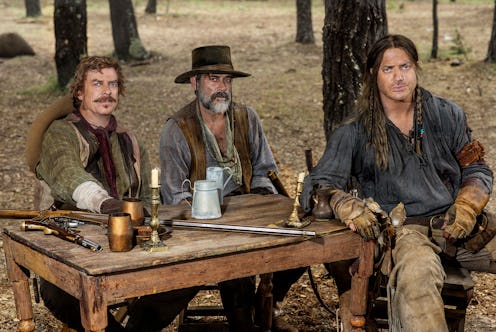Entertainment
'Texas Rising' Created A New Character With Billy

Brendan Fraser's career has gone on a long and winding journey for the past few years, eventually seeming to die a quiet death sometime around the release of Furry Vengence. But after his role of Billy Anderson in Texas Rising, maybe it will give him a new life as a cable supporting player. And in a cast of dozens, Billy Anderson is an original character, rather than a real historical figure. Like Ray Liotta's performance as Lorca, the suffering Alamo veteran, Fraser is saddled with kind of a cliche character, to be honest, a white man living among Native Americans, but unlike some other portrayals, this one does seem to go a bit deeper than the usual trope.
Billy Anderson is a white man who grew up with Kiowa tribe, but still uses his white name. Yet at the same time, he speaks multiple languages and moves between the Kiowa and white communities with ease. Because Texas is in a transitional phase during the events of Texas Rising, the conflict between the Mexican, Native American, and white populations is perfectly represented in Billy, who joins Sam Houston and the Rangers after spending the rest of his adult life among the Kiowa. This whole conflict? Created for the show. But there's plenty about Billy Anderson that actually resembles some figures from other old west stories. Whether the writers were just having fun with the slight resemblances, playing off of familiar tropes, or truly tried to get inspiration from real history, it seems like there's plenty of film/television precedent supporting the creation of this character.
Gilbert "Bronco Billy" Anderson
The name, "Billy Anderson," is the same as Gilbert "Bronco Billy" Anderson, a star of early twentieth century Westerns. History could be playing on that similarity, especially because he was one of the original screen cowboys, and Fraser is playing one of the most recent screen cowboys.
The Searchers
The "white native" stereotype is treated as a tragedy in The Searchers , a John Wayne film where Wayne's niece is kidnapped by Comanche Native Americans. This marked a sharp shift in Wayne's movie career, as he was playing a dark, racist man rather than the square cowboys from his earlier work. And the film doesn't spend much time with the kidnapped niece, but it does try to add some nuance by having her resist her "rescue."
The Last Of The Mohicans
In this book, adapted into a '90s movie that launched a bazillion crushes on Daniel Day Lewis, the adopted white son of the "last Mohican" chief watches as the French and Indian War all but puts an end to his entire culture. Anderson, also an adoptee, could be feeling similar conflict as he leaves his chosen family to fight with a group of white men.
Dances With Wolves
I have a confession... I can't stand this one. But Dances With Wolves , Kevin Costner's Oscar-winning directorial effort about a Civil War soldier turned Sioux sympathizer was the standard bearer for the "white man as Native American" trope since its 1990 release, and launched the sentimentality surrounding the idea of white people connecting with Native Americans meaning that they were connected to themselves. And it also represents a roadmap of where Texas Rising should not take Billy Anderson's character.
If Texas Rising really wants to show an insider's look at the west, it should make sure to give Billy's Kiowa family as much development as it does his time with the Texas Rangers.
Images: Prashant Gupta/HISTORY; Giphy (2)